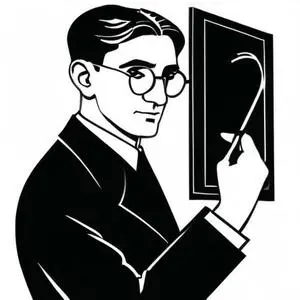
A writer of surreal, psychologically complex fiction that explores the human condition, often featuring isolated protagonists in absurd, nightmarish scenarios.
Unraveling the Mystique of Franz Kafka: The Twentieth Century's Master of the Absurd
Franz Kafka, a Czech-born German-language writer, is renowned for his groundbreaking literary works that seamlessly merge realism with the fantastical, crafting a unique brand of psychological fiction that continues to fascinate readers to this day. His oeuvre, characterized by themes of alienation, existential anxiety, guilt, and the absurd, has earned him a place among the pantheon of literary giants.
Franz Kafka was born on July 3, 1883, in Prague, the capital of the Kingdom of Bohemia (now the Czech Republic), to a middle-class German-speaking Jewish family. Hisfather, Hermann Kafka, was a successful merchant, and his mother, Julie Kafka (née Löwy), was a homemaker. Kafka was the eldest of six children, and his family played a significant role in shaping his worldview and writing style.
Kafka trained as a lawyer and worked as an insurance clerk, leaving him with limited time for writing. Despite this, he was prolific, often scribbling away late into the night. This double life, marked by the tension between his real-world responsibilities and his literary pursuits, is reflected in his work, where protagonists frequently struggle with bureaucratic labyrinths and existential crises.
Kafka's most famous works include:
Kafka's work has had a profound impact on modern literature, philosophy, and popular culture. The term "Kafkaesque" has entered the English language, describing situations that are absurd, illogical, and nightmarish. His influence can be seen in the works of authors like Albert Camus, Jean-Paul Sartre, and Harold Pinter, as well as in film, literature, and art that explore the human condition.
Kafka's personal life was marked by struggles with self-doubt, anxiety, and relationships. He was engaged to several women but never married, and his letters to family and friends offer a glimpse into his inner turmoil. His complex relationship with his father, whom he saw as a symbol of authority and oppression, is often reflected in his writing.
Franz Kafka's work continues to captivate readers and inspire writers, philosophers, and artists. His unique blend of realism and the absurd has left an indelible mark on modern literature, and his themes of alienation, guilt, and the search for meaning remain eerily relevant in today's society.
In the end, Kafka's legacy is a testament to the power of fiction to illuminate the human condition, and his works continue to haunt and inspire us, like the ghosts of his characters, forever trapped in the labyrinthine corridors of his imagination.

Born in 1884
A Czech writer, composer, and journalist who preserved and published the works of his friend Franz Kafka, introducing his unique literary style to the world. He also wrote novels, plays, and essays, exploring themes of identity, morality, and social justice.
Born in 1878
A philosopher who explored the nature of human relationships, dialogue, and existence, and is best known for his concept of "I-Thou" relationships, which emphasizes mutual respect and understanding.
Born in 1879
A brilliant physicist who developed the theory of relativity and is considered one of the most influential scientists of the 20th century, known for his groundbreaking work in physics and mathematics.
Born in 1856
Pioneering psychoanalyst who developed theories on the subconscious mind, childhood experiences, and the structure of personality, revolutionizing our understanding of human behavior and psychology.
Born in 1898
A German-Swiss soldier and author, best known for writing the classic novel "All Quiet on the Western Front", a powerful anti-war tale that vividly depicts the horrors of World War I.
Born in 1877
A renowned poet, novelist, and painter, celebrated for his thought-provoking and introspective works that explore the human condition, spirituality, and the search for meaning. His writings often blended elements of psychology, philosophy, and mysticism.
Born in 1875
A renowned literary mastermind, celebrated for crafting complex, psychologically rich novels that probed the human condition, often blending philosophy and art.